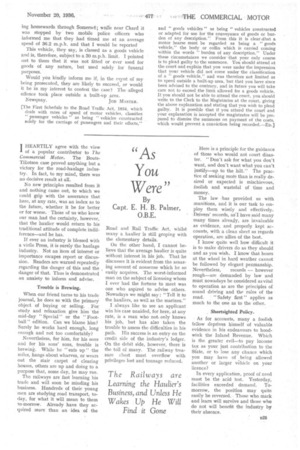"As You Were
Page 39

If you've noticed an error in this article please click here to report it so we can fix it.
By Capt. E. H. B. Palmer, O.B.E.
HEARTILY agree with the view 1 of a popular contributor to The Commercial Motor. The BoutsTillotson case proved anything but a victory for the road-haulage industry. In fact, to my mind, there was no decisive result at all.
No new principles resulted from it and nothing came out, to which we could grip with the assurance that here, at any rate, was an index as to the future, whether, it be for better or for worse. Those of us who knew our man had the certainty, however, that the haulier would return to his traditional attitude of complete indifference—and he has.
If ever an industry is blessed with a virile Press, it is surely the haulage industry. Not an item of interest or importance eScapes report or discussion. Readers are warned. repeatedly regarding the danger of this and the danger of that. Thus is demonstrated an anxiety to inform and advise.
Trouble is Brewing.
When our friend turns-to his trade journal, he does so with the primary object of buying or selling. For study and relaxation give him the mid-day " Special " or the " Football " edition. Can we blame him? Surely he works hard enough, long enough and not too comfortably?
Nevertheless, for him, for his sons and for his sons' sons, trouble is brewin&. While he "eats up" the miles, hangs about wharves, or wears out the stair carpet of clearing houses, others are up and doing to a purpose that, some day, he may rue.
The railways are fast learning his trade and will soon be minding his business. Hundreds of their young men are studying road transport, today, for what it will mean to them to-morrow. Already have they acquired more than an idea of the
Road and Rail Traffic Act, whilst many a haulier is still groping with the elementary details.
On the other hand, I cannot believe that the average haulier is quite without interest in his job. That he discusses it is evident from the amazing amount of nonsense which he so easily acquires. The worst-informed man on the subject of licensing whom I ever had the fortune to meet was one who aspired to advise others. Nowadays we might say: "Tell it to the hauliers, as well as the marines."
I always like to see an applicant win his case unaided, for here, at any rate, is a man who not. only knows his job, but has also taken the trouble to assess the difficulties in his path. His success is an entry on the credit side of the industry's ledger. On the debit side, however, there is the toll of many. The railway treasure chest must overflow with privileges lost and tonnage reduced. Here is a principle for the guidance of those who would not court disaster. "Don't ask for what you don't want, and don't want what you can't justify—up to the hilt." The practice of seeking more than is really desired or expected. is mischievous, foolish and wasteful of time and money.
The law -has provided us with munitions, and it is our task to employ them wisely and effectively. Drivers' records, as'I have said many many times already, are invaluable as evidence, and properly kept accounts, with a clean sheet as regards operation, are allies of the best.
I know quite well how difficult it is to make drivers do as they should and as you wish. I know that hours at the wheel in hard weather cannot be followed by elegant penmanship.
Nevertheless, records — however rough—are demanded by law and must nowadays be considered as vital to operation as are the principles of sound driving and the rules of the road. "Safety first" applies as much to the one as to the other.
Shortsighted Policy.
As for accounts, many a foolish fellow deprives himself of valuable evidence in his endeavours to hoodwink the Inland Revenue. Which is the greater evil—to pay income tax as your just contribution to the Sate, or to lose any chance which you may have of being allowed another or larger vehicle on your licence?
In every application, proof of need must be the acid test. Yesterday, facilities exceeded demand. Tomorrow, the position may quite easily be reversed. Those who mark and learn will survive and those who do not will benefit the industry by their absence.




























































































